Flashback Friday.
Emma M.H., Rebecca A., Natalee B., Josh L., Anna M., Jordan G., and an anonymous reader all sent in a link to a new analysis released by OkTrends, this time of members’ profile essays and the likes/interests/hobbies the essays mention, broken down by race/ethnicity and gender. They list items that were statistically unevenly distributed by race/ethnicity, showing up much more in some groups’ profiles than others’; these aren’t necessarily the most common items listed by each group.
White men:
White women:
 Christian Rudder, the author of the OkTrends post, points out an interesting trend: rural identifying/mythologizing. White men mention “I’m a country boy,” while for White women, being a “country girl” features prominently, meaning both groups are more likely to use this term than other racial/ethnic groups. The men also mention liking hunting/fishing, while White women include horses/horseback riding, bonfires, and the “midwest,” as well as country music/musicians. Most OkCupid users, according to Rudder, are in large metro areas. Of course, you can live in a city and still go riding or fishing, or these can be things you did before you moved to the city that you still really wish you could do and so remain an important part of your identity; and given current demographics, it’s more likely that a former rural resident would be White than non-White, thus showing up more in Whites’ profiles. But I also suspect that references to the “midwest,” or things associated with romanticized rural life (you know, running around in a beautiful wheat field during a thunderstorm and stuff) are a code for a certain type of masculinity and femininity. Among Whites, hunting/fishing indicates you’re a particular type of “guy’s guy,” while being “a country girl” who likes horses and thunderstorms is, I think, a stand-in for implying you’re down-to-earth, nice, not superficial. Being “country” is thus, a lot of the time, shorthand for being authentic.
Christian Rudder, the author of the OkTrends post, points out an interesting trend: rural identifying/mythologizing. White men mention “I’m a country boy,” while for White women, being a “country girl” features prominently, meaning both groups are more likely to use this term than other racial/ethnic groups. The men also mention liking hunting/fishing, while White women include horses/horseback riding, bonfires, and the “midwest,” as well as country music/musicians. Most OkCupid users, according to Rudder, are in large metro areas. Of course, you can live in a city and still go riding or fishing, or these can be things you did before you moved to the city that you still really wish you could do and so remain an important part of your identity; and given current demographics, it’s more likely that a former rural resident would be White than non-White, thus showing up more in Whites’ profiles. But I also suspect that references to the “midwest,” or things associated with romanticized rural life (you know, running around in a beautiful wheat field during a thunderstorm and stuff) are a code for a certain type of masculinity and femininity. Among Whites, hunting/fishing indicates you’re a particular type of “guy’s guy,” while being “a country girl” who likes horses and thunderstorms is, I think, a stand-in for implying you’re down-to-earth, nice, not superficial. Being “country” is thus, a lot of the time, shorthand for being authentic.
Moving on, here’s the image for Black men:
 We see more self-description than in White men’s profiles — “I am cool,” “tall, dark, and handsome,” “god-fearing,” “calm,” “laid-back guy.” White men (and to a lesser extent women) seem to focus on what they like, not really what they are like, with only “I’m a country boy” and “I can fix anything” showing up in the analysis.
We see more self-description than in White men’s profiles — “I am cool,” “tall, dark, and handsome,” “god-fearing,” “calm,” “laid-back guy.” White men (and to a lesser extent women) seem to focus on what they like, not really what they are like, with only “I’m a country boy” and “I can fix anything” showing up in the analysis.
Black women:
 If you combined general references to religion, they would stand out even more. In fact, African American men and women are quite a bit more likely than other groups to mention religion:
If you combined general references to religion, they would stand out even more. In fact, African American men and women are quite a bit more likely than other groups to mention religion:
 Like Black men, they more frequently than White men mention personality characteristics — “I’m a funny guy,” “respectful,” “I’m a simple guy,” “outgoing and funny,” etc.
Like Black men, they more frequently than White men mention personality characteristics — “I’m a funny guy,” “respectful,” “I’m a simple guy,” “outgoing and funny,” etc.
Latinas, like Latino men, mention specific dances, not just a love of music or musicians:
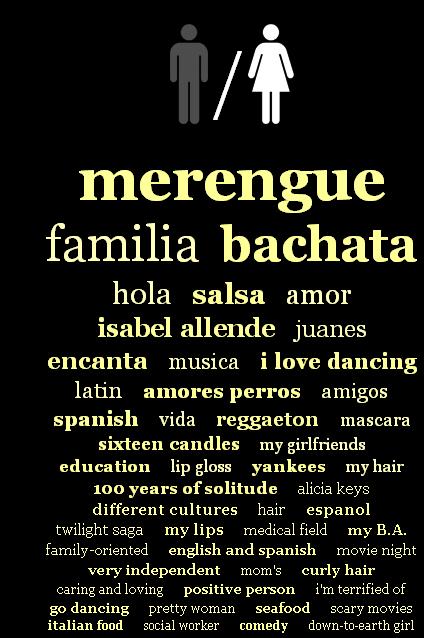 Rudder notes that Asian men are the most likely of any group to highlight a specific ethnic/national identity in addition to the more general “Asian” label:
Rudder notes that Asian men are the most likely of any group to highlight a specific ethnic/national identity in addition to the more general “Asian” label:
 I see that above with Latino men, too — references to being Peruvian, Colombian, Dominican, etc. If I had to take a stab at explaining this, I’d guess it was related to differences in how racial/ethnic categories have been applied to different groups. In the U.S. over time, White ethnic categories (say, being Dutch-American vs. Polish-American) have largely faded into the background, all subsumed under the powerful racial label “White.” Distinctions within that grouping have become largely optional, a neat thing to mention, perhaps, but not very socially meaningful. African Americans have often found themselves in the same situation, but due to much more negative forces. The generally shared experience of slavery, racism, and discrimination, as well as negative stereotypes of anyone perceived as Black, mostly erased ethnic identifications among African Americans. Being Black became a master status, such a socially important racial categorization that even those who wanted to be recognized as from a specific location (South Africa, Jamaica, etc.) often found themselves unable to get others to recognize their ethnic distinction.
I see that above with Latino men, too — references to being Peruvian, Colombian, Dominican, etc. If I had to take a stab at explaining this, I’d guess it was related to differences in how racial/ethnic categories have been applied to different groups. In the U.S. over time, White ethnic categories (say, being Dutch-American vs. Polish-American) have largely faded into the background, all subsumed under the powerful racial label “White.” Distinctions within that grouping have become largely optional, a neat thing to mention, perhaps, but not very socially meaningful. African Americans have often found themselves in the same situation, but due to much more negative forces. The generally shared experience of slavery, racism, and discrimination, as well as negative stereotypes of anyone perceived as Black, mostly erased ethnic identifications among African Americans. Being Black became a master status, such a socially important racial categorization that even those who wanted to be recognized as from a specific location (South Africa, Jamaica, etc.) often found themselves unable to get others to recognize their ethnic distinction.
The broader “Asian” and “Hispanic” labels emerged more recently in U.S. history, and members of both groups often actively fought to preserve distinctions within them. It wasn’t until the ’60s that a pan-Asian identity really began to emerge, such that being called “Asian” really meant anything to people, as opposed to thinking of themselves as Chinese, Vietnamese, etc. And “Hispanic” refers to ethnicity, not race (most Hispanics identify as White); ethnic identities are generally more flexible than racial categories. Aside from personal attachments, many groups thrown into the labels Asian and Hispanic have seen clear advantages to preserving distinctions based on nationality, believing that, say, being Japanese American would be less negatively stereotyped than being simply “Asian.”
So I wasn’t extremely surprised to see that Latino and Asian men specified identifies within those categories…but look back at the Latina image, and then this one for Asian women:
 Nothing. Not one specific identifier for either group stood out. I don’t know what to make of that, and would love to hear your suggestions.
Nothing. Not one specific identifier for either group stood out. I don’t know what to make of that, and would love to hear your suggestions.
There are also specific breakdowns for Asian Indians and Pacific Islanders on the OkTrends, if you’re interested.
Middle Eastern men (a sort of odd category, but whatever) also specify nationalities, which is to be expected as this is another group that has engaged in active contests about their racial categorization in the U.S. (in particularly, fighting to be considered White, not Asian or Black) and also focus on technical/financial careers or expertise:
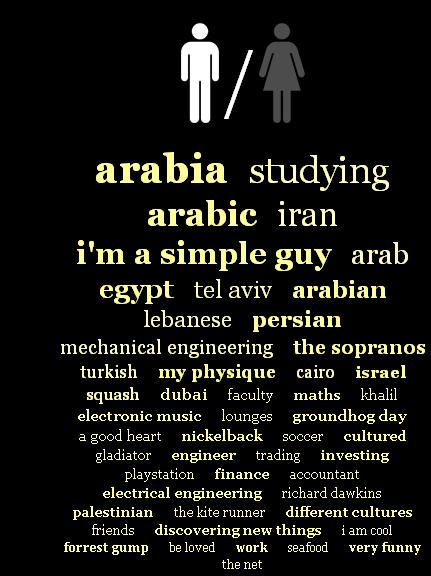 Middle Eastern women are the only group who prominently mention something about their physical appearance (“petite”), for whatever that’s worth, and again, no nationalities listed:
Middle Eastern women are the only group who prominently mention something about their physical appearance (“petite”), for whatever that’s worth, and again, no nationalities listed:
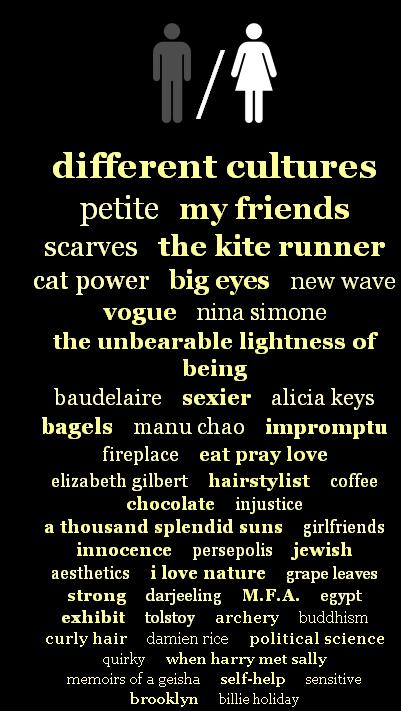 Of course, as Anna pointed out when she sent in the link, this data isn’t necessarily about people’s actual likes/interests, it’s about what they present as their likes/interests in the dating marketplace. On a dating website, you’re trying to present a profile of yourself…but one tailored to be attractive to others. She wonders to what degree social stereotypes of your racial group, as well as the group you’re interested in dating (if you have any preference) affects how you would describe your interests. That is, it’s possible that in some cases people highlight interests or hobbies that seem to fit social expectations of what they’ll like doing…or what they think the individuals they want to date will want to do, or want their date to want to do. To interpret these results, as OkTrends does, as straightforward evidence of differences in preferences by race/ethnicity, ignores the important fact that these are interests presented as part of an intentional performance for strangers, and may or may not reflect what we actually spend time doing, learning about, or paying attention to in our daily lives.
Of course, as Anna pointed out when she sent in the link, this data isn’t necessarily about people’s actual likes/interests, it’s about what they present as their likes/interests in the dating marketplace. On a dating website, you’re trying to present a profile of yourself…but one tailored to be attractive to others. She wonders to what degree social stereotypes of your racial group, as well as the group you’re interested in dating (if you have any preference) affects how you would describe your interests. That is, it’s possible that in some cases people highlight interests or hobbies that seem to fit social expectations of what they’ll like doing…or what they think the individuals they want to date will want to do, or want their date to want to do. To interpret these results, as OkTrends does, as straightforward evidence of differences in preferences by race/ethnicity, ignores the important fact that these are interests presented as part of an intentional performance for strangers, and may or may not reflect what we actually spend time doing, learning about, or paying attention to in our daily lives.
Originally posted in September, 2010.
Gwen Sharp is an associate professor of sociology at Nevada State College. You can follow her on Twitter at @gwensharpnv.
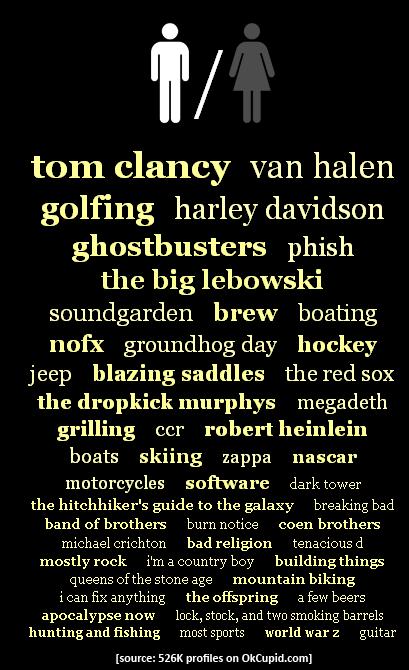
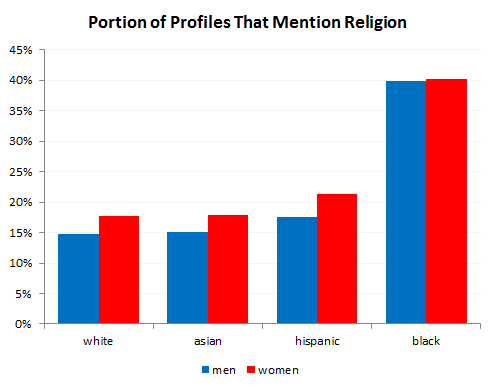
Comments 54
nomadologist — September 10, 2010
Why does Baudelaire rank so high among Middle Eastern women?
Jim H — September 10, 2010
I think you do need to be careful to point out again that these are just the statistically differences, not necessarily what was most popular--just because more white men and women identify themselves as "country" does not necessarily mean that "country" is useful for "down to earth" for the entire white population.
As for the differences between Latino and Asian men and women? I think you hit the nail on the head about the effect of race and ethnicity when they're differently used as forced or "voluntary" categories. From some (very limited) experience interviewing people about ethnicity (or you know, you could just go pick up one of the thousands of well-researched books about race or immigration), people who have been subjected all their lives to (not necessarily overt) categorization will often talk about themselves more as a way to either consciously or subconsciously respond to the societal stereotype. While someone who's not being forced into a racial or ethnic category can focus on what they like, what someone likes and who they are becomes tied up with racial politics for those who don't have that luxury.
What's often unsaid is that men and women often face gendered racial and ethnic stereotypes. These gendered stereotypes work in two directions. The first direction is that Latino men and Asian men often face different racial and ethnic stereotypes from their women counterparts. While Asian and Latina women often have "mainstream" (though very biased and quite ugly) fetishes attributed to them, there aren't exactly fetishes floating around for Asian or Latino men. Now fetishes aren't exactly a boon, but being Asian or Latina doesn't impinge on anyone's concept of femininity, while being Asian or Latino does impinge on people's concept of masculinity.
The second direction, and on this I can only comment about Asian women because I don't know enough about how Latina women are perceived in their ethnic communities, is that the gender stereotype for Asian women in Asian communities is often much worse than the less-than-perfect gender stereotype for "non-ethnic" women or even the fetishes in non-Asian communities. So while Asian men might turn to an ethnic identity for solace and relief (and frankly a sense of masculinity: see the prevalence of sports and money references) Asian women might be much less likely to turn to racial identity as a place to express personal strength. Some Chinese women I interviewed who had grown up with a Chinese identity--for example--shed the Chinese identity when it came into conflict with their sense of self as an independent woman. I hope that explanation made some modicum of sense about the gender difference.
On an utterly banal note, I think the differences in mainstream band choices between ethnic, groups to be sort of hilarious--phish vs. dmb vs. nickelback, etc?
anastasia — September 10, 2010
nomadologist:
I noticed that too! and also love 'the unbearable lightness of being'! i see tolstoy gets a mention too. why are middle eastern women such serious readers? or why do they want to present themselves as such?
it really interested me as well that milan kundera was so high up there, a book which i think represents sexual liberation of men and women and has also been highly criticised for being misogynist or at least offensive to women in its tone. are middle eastern women saying - i'm sexually liberated and i'm not gonna get all feminist on you? am i reading way too much into it?
Eve — September 10, 2010
Sorry, I don't understand. What is odd about the Middle Eastern category?
anastasia — September 10, 2010
what i also absoltuely love is that asian guys like calvin and hobbes! that would totally win me over in a guy ;-)
oliviacw — September 10, 2010
One thing that stood out to me was the appearance of two military references for Latino men - "stationed" and "marines." I do know that Latinos in the US have relatively high rates of military participation, but it's still interesting to see that those were distinctive descriptors on a dating site.
Gk — September 11, 2010
I was interested by the emphasis on what in the UK gets termed south east asian - no mention of being from India or Pakistan or Bengal etc.
I noticed this when talking to my sister in law (American) I say Asian and I mean India, Pakistan etc, she says Asian and she means Korean, Thai, Chinese etc...
AO — September 11, 2010
Few questions:
What does "phish" mean?
What is "the red soxs"?
What is "soul food"?
What does "espn" mean?
What is "merengue"?
What does "coz" mean?
Domingo — September 11, 2010
You didn't need to repost and paraphrase the entire OKTrends article to comment it. You could just link to it.
Leslie — September 11, 2010
I'm glad you wrote about this! I thought of Sociological Images as soon as I saw the original OKC blog post.
One thing that stood out to me almost immediately, but that you didn't mention here: as the OKC blogger points out, white men's profiles are a "sausage fest," that is, filled with extremely stereotypically masculine things. Nothing at all girly on there. But white women's profiles include quite a few stereotypically "masculine" things - NASCAR, baseball teams, outdoor sports, country singers (actually, I don't know if those singers sing "manly" music or not... but still, they're male singers, and there aren't *any* female singers on the white men's list).
I'm not sure if the world/this blog needs another illustration of how women incorporate masculinity into their identity because it is privileged, but the opposite doesn't happen with men, because femininity is degraded – but there you have it.
(Interestingly, this effect seemed to be less noticeable among women of other ethnic/racial backgrounds.)
Anonymous — September 11, 2010
You mention that Middle Eastern women are the only ones who list a physical characteristic ("petite"). This is incorrect--"petite" is also listed for Asian women.
syd — September 11, 2010
You didn't touch on the rest of the graphs! While these graphs are kind of interesting, they also had some pretty disturbing graphs basically saying Christians (both Protestant and Catholic), as well as blacks and Latinos, are illiterate. I'd really like to know how they came to THAT conclusion. Particularly because Latinos (a predominantly Catholic group), I believe, ranked lowest among race in 'literacy,' yet Latino women, at least, express in the above graphs an extremely high interest in literature (see how huge Isabel Allende is??) and education (both 'education' and 'my B.A. being pretty prominently featured), and Latino men do as well to a somewhat lesser extent ('attending college'). Black women also mention higher education ('in nursing') and a variety of literature. I suspect that 'literacy' level is based on the amount written and whether that is written in 'proper' English. In both the black and Latino men's charts, there is evidence of 'chatspeak.' Chatspeak, while incredibly annoying to certain people, is NOT indicative of a lack of intelligence or literacy. Also, both Latino men and Latina women have words in their charts that are NOT proper English....because they are in Spanish. Chatspeak and 'Spanglish' are not proper English, no, but when used in casual conversation (like one might use in an online dating site), are in no way indicative of being illiterate.
Le Chat Noir — September 12, 2010
Did noone notice that the symbol for "men" comes FIRST, that is before the symbol of woman? Even in graphics, women are treated as second class citizens.
Kishh — September 12, 2010
Also, uh. Why is the title of the original article "The stuff WHITE people like"? Ideology that white people are the superior, or just a little way to catch your attention? Or perhaps people DO search for white women more than women of other skin colour?
Tom Adams — September 12, 2010
Gwen: you said "African American" when the sampling wasn't limited by locale.
I find that term very interesting in that it's become such a dominant term for black people in the US that Americans manage to use it accidentally to refer to all black people.
"Oh, so you only hunt African American vampires?"
"No, sometimes I hunt British vampires. They don't have African Americans in England!"
(The Venture Bros)
Somebody in the comments mentioned that the data is more reflective of African Americans than, in her case Jamaican black women. I would suspect a high proportion of OKC's users are in the US, and I'm sure they have a graph somewhere about that.
Simone Lovelace — September 13, 2010
Okay, now that the discussion has died down some, I don't feel to derail-y asking this: why do some many men (of several different races) say "I'm a simple guy." What does that even mean, and why is it supposed to be attractive?
Jillian C. York — September 15, 2010
Just a quick "correction" of sorts: While you're correct that historically, some Arab groups (most notably Syrians and Lebanese) have fought to be considered white (historically, again, for land-ownership purposes), there has also been a strong campaign for the US Census to consider "Arab" an ethnicity or race.
nina — September 15, 2010
I think specific dances are mentioned and specific nationalities by "Latinos" because they are advertising their culture and seeking a match within that. I dance,but I want a man who dances salsa,merengue,and bachata so I will look specifically for those words in profiles. I do not want a man who dances tango or cumbia.
Don't Asian women have the highest rates of outmarriage in the US? It seems likely that they are advertising to find a man,not a man who wants an Asian woman so there is no need to put keywords in there to attract a man who wants a woman who eats kimchi or wears kimonos or saris,for example.
Black Women Deserve Better » Blog Archive » See Yourself In A New Light & Watch What Happens…Congratulations Jon & Ebony! — September 25, 2010
[...] was on the internet today and found this: http://thesocietypages.org/socimages/2010/09/10/race-gender-and-likes-on-okcupid/. It’s a breakdown by OK Cupid (a dating site) about how different ethnicities and genders [...]
Anonymous — February 8, 2011
I think Alicia keys made this piece of research...
Hahaha but seriously though she is seems to be an important factor of everyone's profile!!
ZA — April 21, 2017
My East Asian straight female friends usually minimize their Asian identity around men bc of Yellow Fever, especially around non-Asian men. Who wants another creeper with an obsession for Vietnamese child brides? They might actually highlight it around Asian men bc they can have a much more nuanced understandings of these identities, without fear of Yellow Fever.
As a South Asian straight woman... I'm part of the Asexual Asian stereotype. I'd want to minimize my Asian identity in hopes of someone thinking of me as a potential date. I intentionally pick photos that make my race a bit more ambiguous. And I don't want to be asked yet again if I can make good curry.
Personally, I avoid dating other Asian men of any sub category bc I have found them to be more sexist.
Usedguns — April 10, 2020
Anda perlu memahami bermain game online.